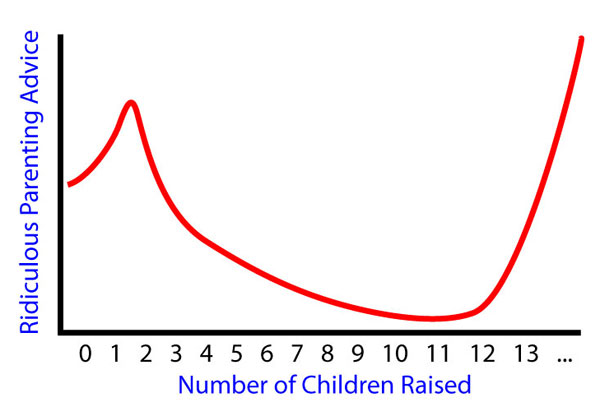After many years of observing and interacting with parents and families of many shapes and sizes, I’ve come up with a model for how likely you are to receive stupid parenting advice during the course of a casual conversation. What do I mean by stupid parenting advice? Not necessarily bad ideas (though there are plenty of those too), but things that only work in specific contexts presented as general guidelines.
Some examples include:
- Letting your child “cry it out” at night
- The utter superiority of co-sleeping with your baby
- The amazing virtues of various diets
- Special techniques to get your baby to walk or talk or perform calculus early
- Making your children do lots of chores
- Never making your children do chores
- Bribing them with money or candy or not
- Letting them watch lots of TV or not
- Giving them strict curfews or not
- How-to advice on hundreds of other common topics
A graph of when you hear these sorts of (usually) worthless suggestions can be seen here:
Young singles have ideas about how they are going to do this or that and will volunteer their opinions (completely devoid of personal experience) more often than you might think.
The absolute worst are parents who have successfully raised an only child. It worked for their kid so it must be the best plan ever! Some of these folks actually write and publish parenting books. They (the books) are complete garbage. Yes, an idea they have may very well be helpful in your situation. But in the very next sentence could be something that will never work in a thousand years. Why? Different kids, different contexts, different houses, different families, different everything.
The more children people have, the more they realize this. Techniques that seemed to help their first daughter to sleep through the night or do their homework have absolutely no effect on their third daughter. You spent a lot of time with your oldest son when he was young, but now you live in a different city and have a more demanding job and you don’t see your second son near as much. You have to figure out different effective ways to relate to him.
This goes on until by the time someone has raised a lot of children, they are hesitant to give any advice at all. I’ve asked folks I know who have 8 or 10 kids for advice and they just mumble something about “it depends…” and then (if you’re lucky) might tell a story that they think might be relevant to your situation. They are old and wise and they know that VERY LITTLE of what they can tell you will actually be of much direct value. You are going to have to figure it out on your own with your own children.
Very general guidelines are all the smartest folks will give you. That’s all you find in scripture too. You get to fill out all the details for your context. It’s a tall order and no one else can do it.
I realized recently that I needed to adjust my model a bit though. Here is my revised graph.
Somewhere around the double-digits, this trend toward wisdom and general guidelines can get hijacked by people’s own high opinion of themselves and their accomplishments. They start dishing out stupid advice again, usually prefacing it with “Well I raised 11 kids and the very best way to do such and such is ______”. Now they are an authority on everything and they have forgotten their humble journey. They are back to publishing parenting books again, this time seemingly immune from criticism. These folks can be ignored too. Don’t let their insistence cause you to second-guess yourself.
So the best of luck to all you parents out there, wherever you are on this continuum. Listen to the ideas out there, especially from people you trust but just remember that each one of your children is different and even the best advice will need some adaptation and discerning application.


